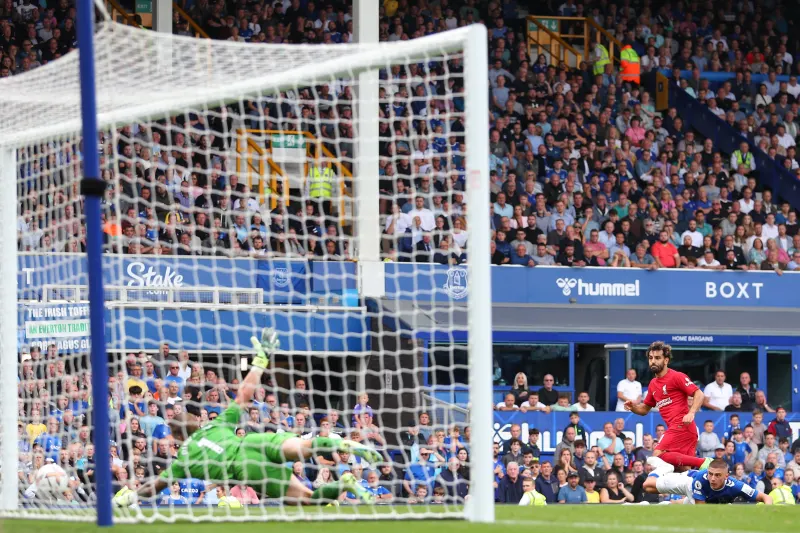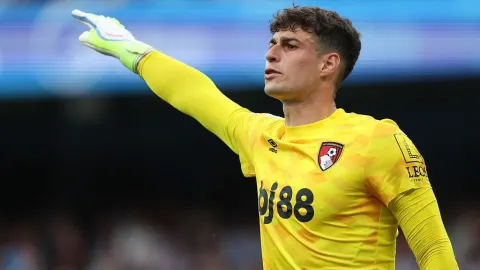Head of Data Science Dr. John Harrison digs into the numbers to uncover just how good Pickford and Alisson were in the Merseyside Derby…
The lunchtime kick off on Saturday was, for some fans, an anti-climax. However, for goalkeepers and fans of goalkeeping everywhere it was far from dull. A 0-0 draw at Goodison Park did not do much to improve either of the Merseyside clubs' indifferent starts to the season but it did highlight the quality of both clubs' goalkeeping departments.
Both Pickford and Alisson performed exceptionally and gave goalkeeping enthusiasts much to celebrate and discuss. Pickford made eight saves during the match while Alisson made four, however, it was not the sheer quantity of saves but the quality and timing of the saves that cemented both goalkeepers as their side's players of the match.
Alisson
Let's first break down Alisson’s shot stopping performance. Below are images of the four saves Alisson made during the match. For each shot, we can use historical data to calculate the probability an average Premier League goalkeeper would make the save by taking into account each shot’s location, pre-shot build-up, trajectory, and velocity. Additionally we can use the same information to evaluate a goalkeeper’s handling by looking at how often an average Premier League goalkeeper would parry such a shot back into danger and concede via a rebound.
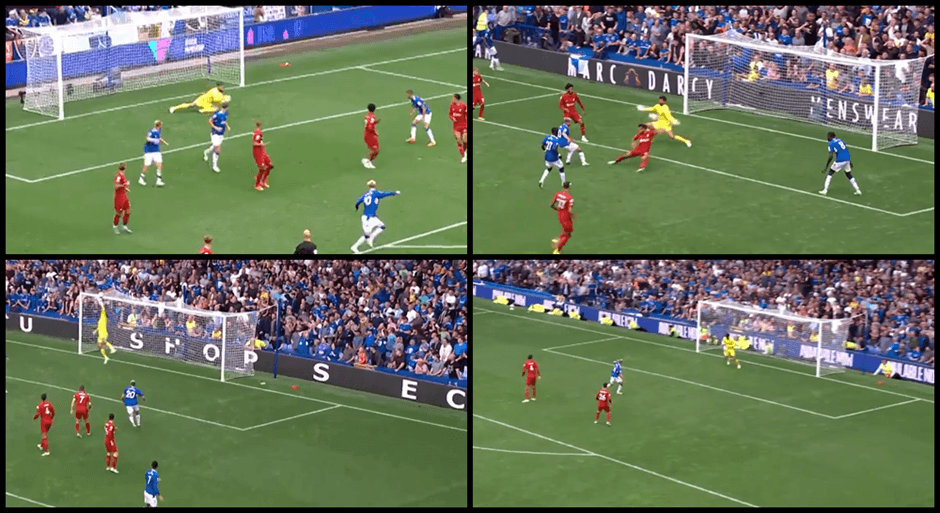
While the first save (top left) was a routine one he would be expected to make (given historical data suggests an average Premier League goalkeeper would be expected to save it 91% of the time) it was vital that Alisson caught the ball given the box was filled with Everton attackers ready to pounce. By catching it rather than parrying it or spilling it, Alisson prevented an additional 0.04 xG vs the average Premier League goalkeeper who in such circumstances would often parry the ball away and concede possession.
The second save (top right) was crucial, coming right after a period of Liverpool domination. Here, Alisson made an excellent decision to step off his line and make himself big, as while it was not a 1v1, Maupay was so close to goal that his reaction time would likely not be enough to make the save. This save would only be expected to be made by an average Premier League goalkeeper 68% of the time but Alisson made it look easy.
Additionally Alisson managed to parry the ball out for a corner rather than back into danger meaning he prevented an additional 0.07 xG occurring via rebounds than would be expected from an average Premier League goalkeeper.
The third save (bottom left) was another case of Alisson making the difficult look easy. This save would only be expected to be made by an average Premier League goalkeeper 70% of the time but Alissons’s excellent footwork, power step technique, and use of the top hand meant he could flick it over the bar with ease. Again there were plenty of Everton players following in so it was vital that Alisson pushed it over the bar rather than onto the bar or back into danger. The fact he got the ball out for a corner prevented an additional 0.05 xG occurring via rebounds than would be expected from an average Premier League goalkeeper.
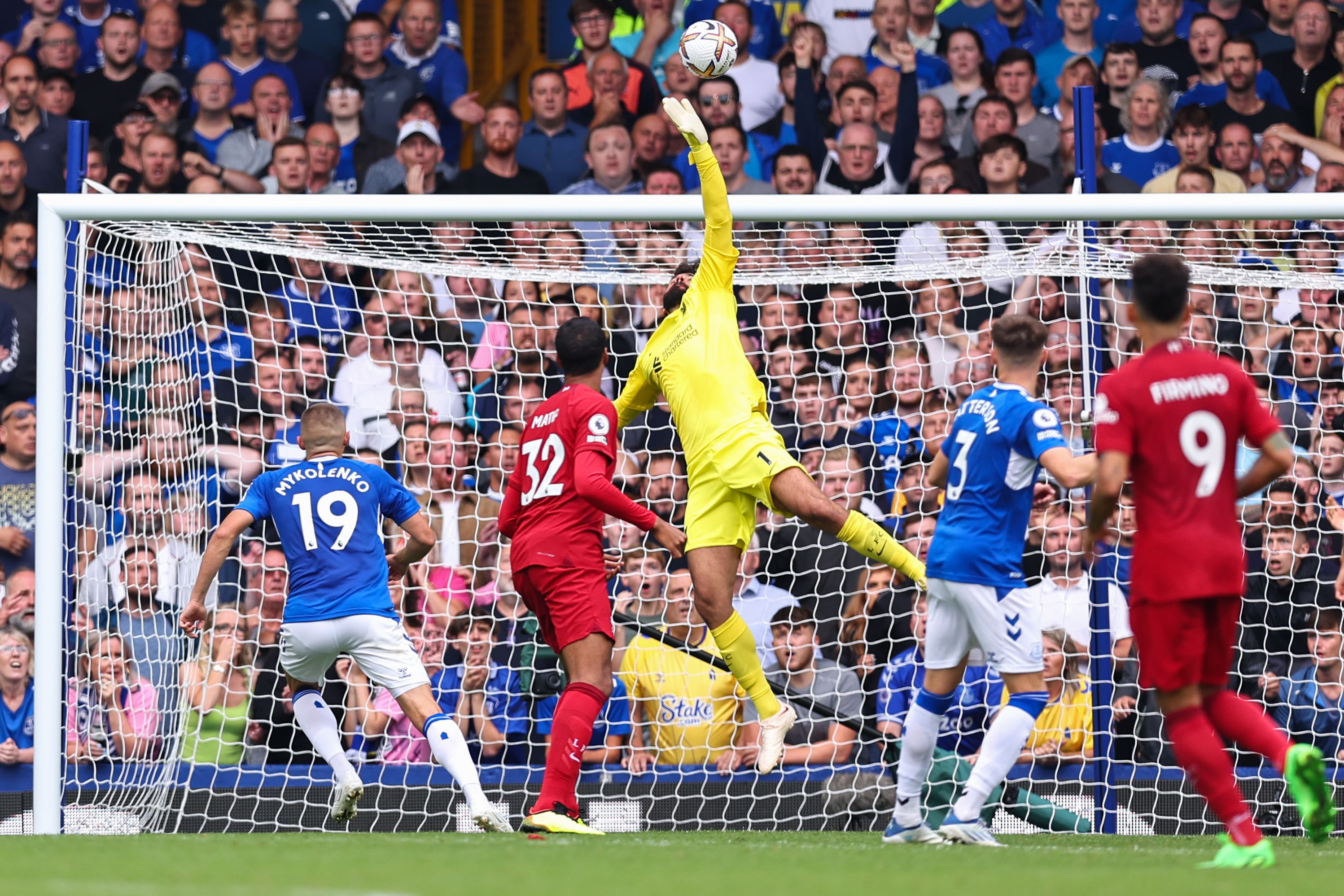
The fourth and final save (bottom right) was another straightforward one which a Premier League goalkeeper would be expected to make and hold almost every time. This is seen in the numbers as this shot is expected to be saved over 99% of the time by an average Premier League goalkeeper and the fact he held it did not prevent any additional xG occurring via rebounds vs the average Premier League goalkeeper.
In conclusion Alisson made two big saves and his handling was exceptional on three occasions meaning that if we evaluate all these moments together we find Alisson saved Liverpool 0.72 goals and prevented an additional 0.16 goals due to exemplary handling. Alisson was therefore worth almost one (0.88) additional goal to Liverpool on Saturday and, therefore, they would've likely lost the match if Liverpool only had an average Premier League goalkeeper between the sticks.
Pickford
We can also analyse Pickford’s performance through the same lens. Below are images of the eight saves Pickford made during the match. Again. for each shot we can use historical data to calculate the probability an average Premier League goalkeeper would make the save given each shot’s location, pre shot build-up, trajectory, and velocity. We can also again use the same parameters to look at how often an average Premier League goalkeeper would parry the ball back into danger and concede via a rebound when faced with such a shot.
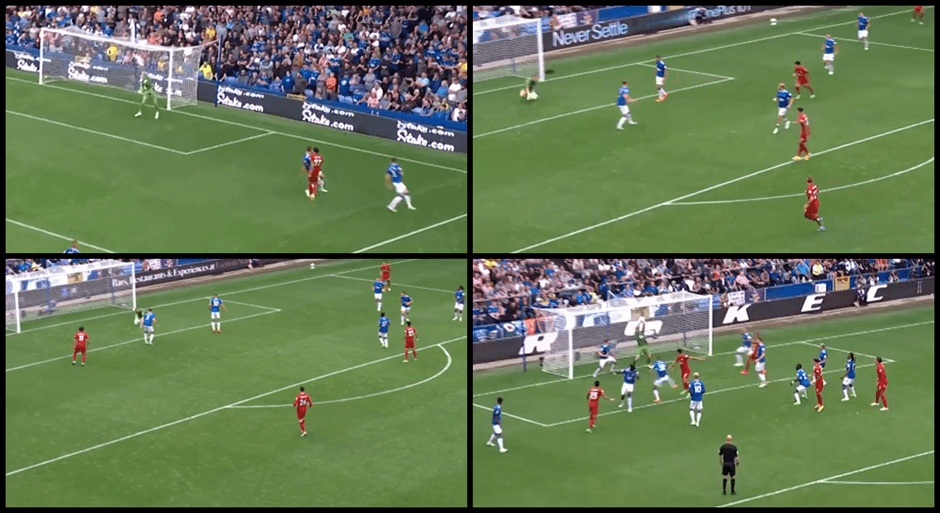
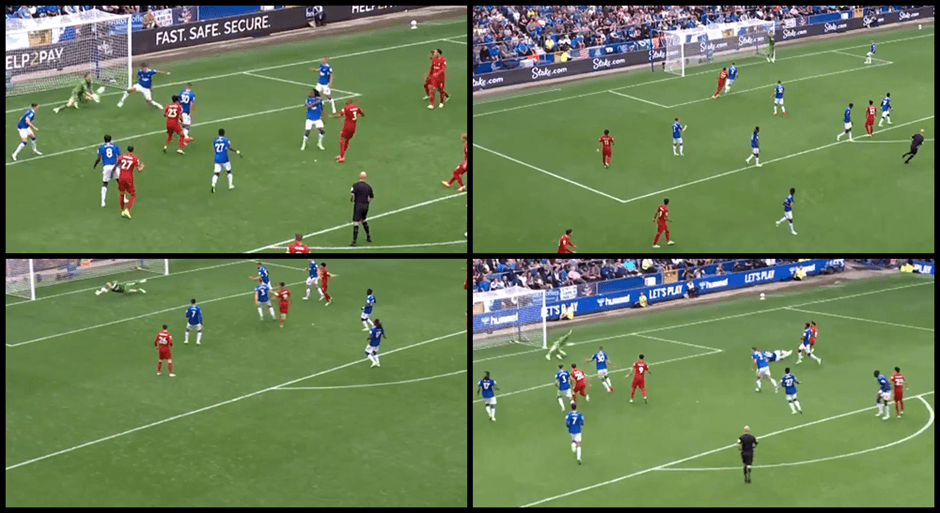
Pickford’s first save (top left first panel) highlighted just how important quick decision making is when playing at the top level. Pickford had a high starting position in order to give himself the best chance of sweeping but once it became clear that Darwin Nunez would reach the ball first and control it, Pickford correctly backed off into his six yard box rather than holding his position. This meant that by the time Nunez struck his volley, Pickford was in a great position with enough reaction time to stick up a hand and flick the shot away from goal.
This save would only be expected to be made by an average Premier League goalkeeper 67% of the time. Additionally, Pickford managed to parry the ball onto the bar and out of the side of the six yard box, meaning he prevented an additional 0.08 xG occurring via rebounds than would be expected from an average Premier League goalkeeper.
Pickford’s second save (top right first panel) was pretty straightforward. A Premier League goalkeeper would be expected to make and hold this shot nearly every time (expected save probability 94% and expected rebound xG 0.02). It would be Pickford’s third save (bottom left first panel) that probably started to make viewers think it could be one of those days for the Liverpool attack. Here Pickford expertly used the negative step dive technique (or collapse dive technique) to quickly get his hand down to the ground as Firmino smashed a shot across the box into the bottom corner.
This save would only be expected to be made by an average Premier League goalkeeper 71% of the time. Pickford’s handling was again excellent and by pushing it out for a corner (a situation which results in a goal just 3% of the time) Pickford prevented an additional 0.09 xG occurring via rebounds than would be expected from an average Premier League goalkeeper given many goalkeepers would theoretically end up parrying that strike back into the danger zone.
Pickford’s fourth save (bottom right first panel) was a case of great positioning, making the save look easy. Pickford’s quick footwork to back pedal onto his line and to position himself centrally meant that he could get a strong two hands behind Firmino's powerful header. Historically, such headers are saved 86% of the time so it wasn’t as comfortable as it may have initially seemed. It should be mentioned that Pickford’s handling was not great though, and by parrying it back into danger he actually granted more xG to the opposition than an average Premier League goalkeeper would’ve and therefore cost Everton 0.08 xG.
Pickford’s fifth save (top left second panel) was an awkward one. Not only did he have to deal with the ball's bounce, but he also had to deal with his defender lunging in front of him at the last second. Given this, Pickford did remarkably well to scoop the ball out for a corner. This save would be expected to be made by an average Premier League goalkeeper 82% of the time. Pickford’s handling was tidier than average and he prevented an additional 0.03 xG occurring via rebounds.
Pickford’s sixth save (top right second panel) was another straightforward one, it did require concentration and tidy footwork to back pedal while keeping his eyes on the ball but such floated shots rarely catch Premier League goalkeepers out and such shots are expected to be saved 95% of the time. His quick footwork did however mean he avoided having to tip the ball over the bar for a corner and thus his tidy handling allowed him to prevent an additional 0.01 xG occurring via rebounds.
Pickford’s seventh save (bottom left second panel) was another big one, Firmino managed to sneak across the front of his marker and get a good contact on the ball but again Pickford utilised the negative step dive technique to his advantage and got down quick as a flash to push the ball away. Historically, shots like this are only saved by Premier League goalkeepers 68% of the time. Pickford’s parry was again not as safe as one would expect, granting Liverpool more xG than an average Premier League goalkeeper would have and therefore costing Everton another 0.06 xG.
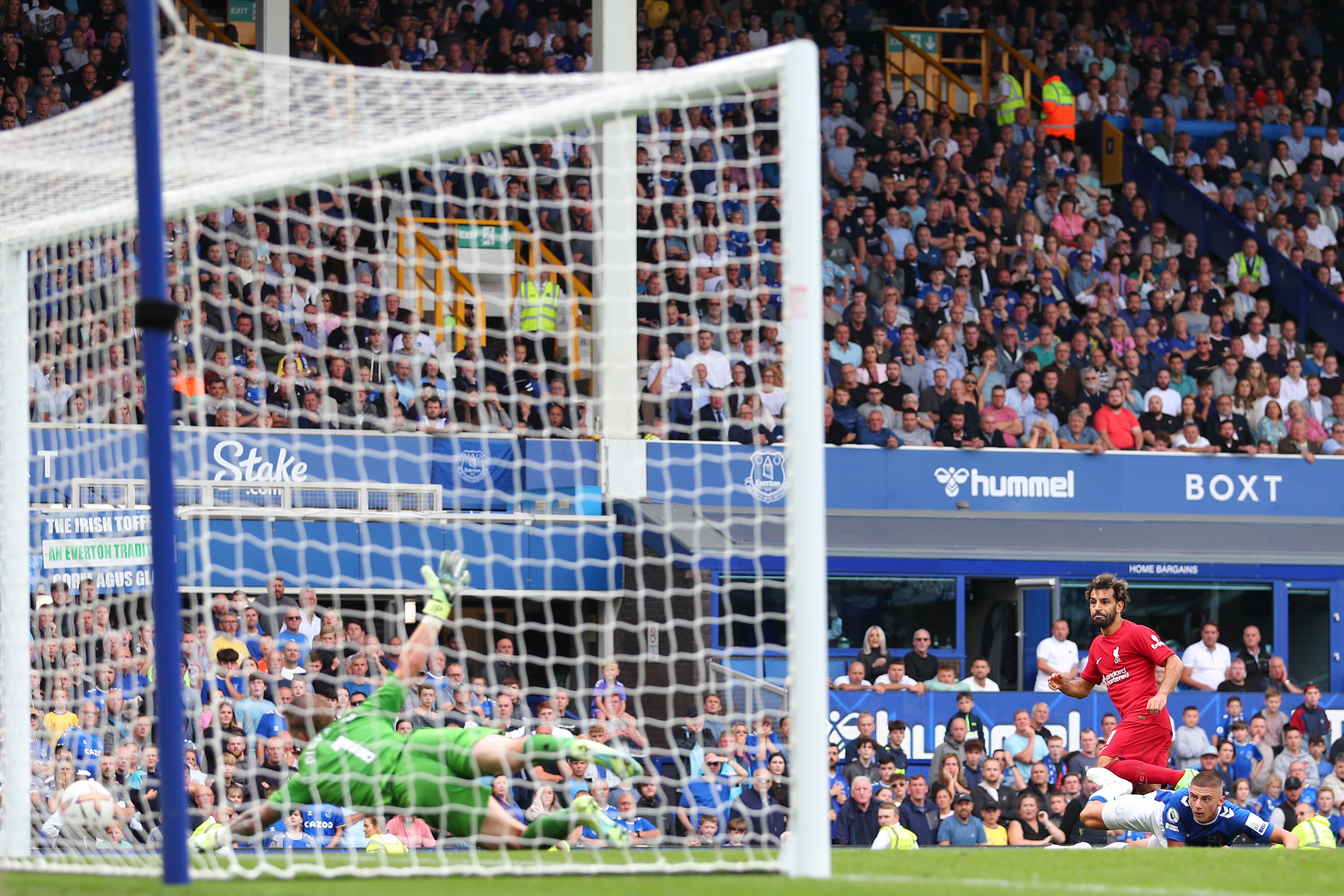
Pickford’s eighth save (bottom right second panel, and image above) was his best of the match. By this point, Pickford was putting on an exhibition of how to perform the negative step (collapse dive) when facing fast low shots outside the range of the foot save. Salah smashed the ball into Pickford’s near post but he again got down quickly to tip it onto the post. This time historical data suggests that such shots are only saved 42% of the time, making it by far the save of the match. Again though, Pickford was a tad fortunate that the rebound led to nothing, as Jota and Salah both fluffed their lines as the ball bounced out to them. Pickford’s parry location granted chances worth 0.38 xG more than on average when such a shot has been saved.
In conclusion, Pickford made four big saves but it should be noted that his handling was not as clean as he may have wanted it to be. If we evaluate all these moments together, we find Pickford saved Everton a huge 1.95 goals while only presenting an additional 0.29 goals due to rebounds granted to the opposition. Therefore Pickford was worth almost two (1.66) additional goals to Everton on Saturday and his man of the match award was thoroughly deserved. After a string of impressive displays from Nick Pope and Dean Henderson during the first month of the season, this performance from Pickford was exactly what he needed to further solidify his case for being England’s starting goalkeeper at the World Cup.
